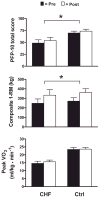Effect of resistance training on physical disability in chronic heart failure
- PMID: 21233772
- PMCID: PMC3410739
- DOI: 10.1249/MSS.0b013e31820eeea1
Effect of resistance training on physical disability in chronic heart failure
Abstract
Purpose: Patients with chronic heart failure (CHF) report difficulty performing activities of daily living. To our knowledge, however, no study has directly measured performance in activities of daily living in these patients to systematically assess their level of physical disability. Moreover, the contribution of skeletal muscle weakness to physical disability in CHF remains unclear. Thus, we measured performance in activities of daily living in CHF patients and controls, its relationship to aerobic capacity and muscle strength, and the effect of resistance exercise training to improve muscle strength and physical disability.
Methods: Patients and controls were assessed for performance in activities of daily living, self-reported physical function, peak aerobic capacity, body composition, and muscle strength before and after an 18-wk resistance training program. To remove the confounding effects of several disease-related factors (muscle disuse, hospitalization, acute illness), we recruited controls with similar activity levels as CHF patients and tested patients >6 months after any disease exacerbation/hospitalization.
Results: Performance in activities of daily living was 30% lower (P < 0.05) in CHF patients versus controls and was related to both reduced aerobic capacity (P < 0.001) and muscle strength (P < 0.01). Moreover, resistance training improved (P < 0.05 to P < 0.001) physical function and muscle strength in patients and controls similarly, without altering aerobic capacity.
Conclusions: CHF patients are characterized by marked physical disability compared with age- and physical activity-matched controls, which is related to reduced aerobic capacity and muscle strength. CHF patients respond to resistance training with normal strength/functional adaptations. Our results support muscle weakness as a determinant of physical disability in CHF and show that interventions that increase muscle strength (resistance training) reduce physical disability.
Conflict of interest statement
The authors recognize no conflicts of interest.
Figures

References
-
- Ades PA, Ballor DL, Ashikaga T, Utton JL, Nair KS. Weight training improves walking endurance in healthy elderly persons. Ann Intern Med. 1996;124:568–72. - PubMed
-
- Ades PA, Maloney A, Savage P, Carhart RL. Determinants of physical functioning in coronary patients. Response to cardiac rehabilitation. Arch Intern Med. 1999;159:2357–60. - PubMed
-
- Ades PA, Savage PD, Brochu M, Tischler MD, Lee NM, Poehlman ET. Resistance training increases total daily energy expenditure in disabled older women with coronary disease. J Appl Physiol. 2005;98:1280–5. - PubMed
-
- Ades PA, Savage PD, Cress ME, Brochu M, Lee NM, Poehlman ET. Resistance training on physical performance in disabled older female cardiac patients. Med Sci Sports Exerc. 2003;35:1265–70. - PubMed
Publication types
MeSH terms
Grants and funding
LinkOut - more resources
Full Text Sources
Medical

